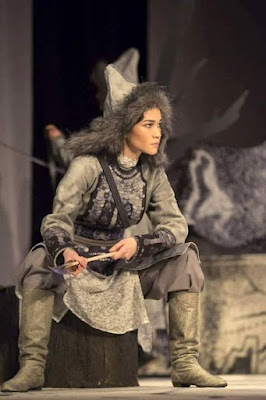I think people are pretty hungry for simple joys. We don't walk in the woods as often as we like, or eat a hunk of bread in flickering candlelight, or study the play of light on a stream, in a crystal, or in motes of dust in the air. We aren't hungry for woe and sorrow, but even those can affirm the meaningful and set our lives into focus compared to the cruel monotony that hums through work floors, grocery back rooms, kitchens not our own, and endless hallways in need of cleaning.
Stories of adventure or horror or romance need these simple sensations to land. They need little beats of contemplation where the characters sing on the road or brush aside cobwebs or stare at a cluttered table while someone is away. Poetry can be helpful, but poetry is inane without a subject we can feel or sense. The way a sentiment like "she was tired from marching and the cheese tasted nice and the place by the fire was warm" is phrased may intensify the feeling if put well or weaken the feeling if put poorly, but even at its simplest these kinds of sentiments need their space in a story.
The sentiment does not need to be original. It does not need to be fresh. Bog-standard fantasy, say, is flush with the lush and lurid. It's easy to forget an old man with a long beard and pointed hat and stars-and-moons robe is a powerful image because it is familiar, but do not let it be forgotten. Put emotive intensity in the description, as though the sentiment was truly original! Have characters react to the strange! If all else fails, straight-up tell "the way he dresses is striking!" We are putting finite words into an infinite world and all performances are fleeting, ever-wearying. Editing is for now-right-now.
Once you have the sentiment, give it action. The man's manner of dress is striking? He should say something striking, or light his pipe with an orc tooth. If you're on your game you can support the sentiment with second-order expressions. Maybe he expresses remorse that a more mundane character has been endangered by the otherworldly that the wizard represents. "I am sorry this has happened to you." How often do your characters seem unsure of themselves, or regretful or overconfident or melancholy? Maybe he's ashamed to be so weird?
So many stories are obsessed with what is happening in the moment. Between crises, we should have time to recall what happened last chapter, last session, last year. We should miss those who were lost and reflect on how we've changed.
So many stories are obsessed with what is happening in the moment. Between crises, we should have time to ponder what we will do once this current task is done. If we live long, how will we manage old age? What will we do with ourselves.
When the story is done, we should cherish the remainder. Study the book you just finished for a few minutes. Roleplaying games are great for this-- their ghosts lay across notebooks and sheets and maps, hopefully in sketches or little songs we wrote or in tables and generators waiting for new purpose.
Ask, for each story and each part:
What is beautiful?
What is strange?
What is missing?
What has changed?
What is meager?
What is great?
What is its evoked emotional state?

How fitting to end this post with a poem.
ReplyDeleteGood advice for writing and RPGing both!
ReplyDelete"but even those can affirm the meaningful and set our lives into focus compared to the cruel monotony that hums through work floors, grocery back rooms, kitchens not our own, and endless hallways in need of cleaning"
ReplyDeleteWas in the grocery store today, picking up ingredients for some chanko nabe (delicious btw) when I remembered these words which resonated with me. Yes indeedy deed, it's a weird feeling to long for even woe and sorrow to break the cruel monotony of the toil of staying alive. Is that poetic? I want a gun. A revolver, preferably.